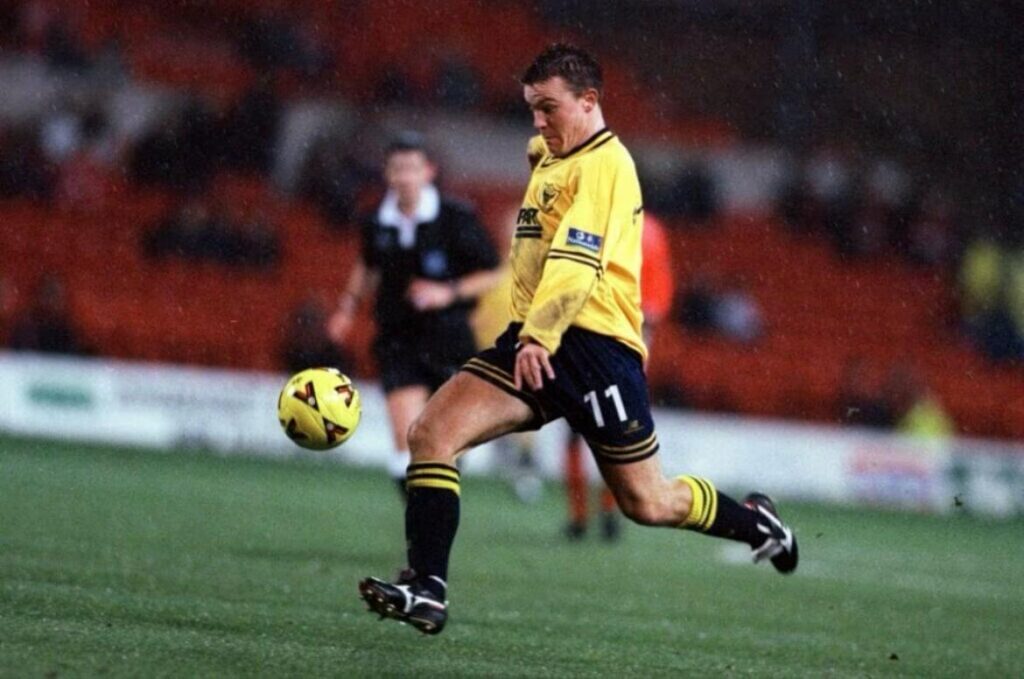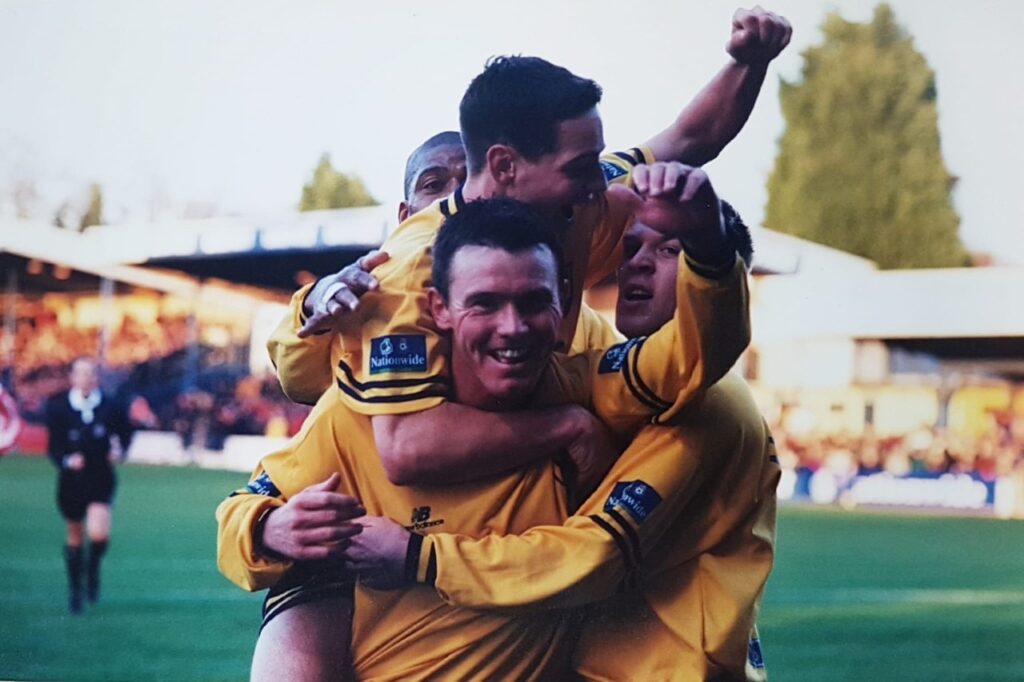Adapted from an article in The Athletic , May 19th 2022
“Oh my God, England caps. Easily. He was just unbelievable. He could go both ways, he scored goals from outside the box, his crossing was ridiculous.”
Late on Monday evening, in the hotel where Oxford United’s players used to meet for their pre-match meal more than 30 years ago, Chris Allen is reminiscing about Joey Beauchamp — his friend, his former team-mate and a footballer who could have been whatever he wanted to be.
What Beauchamp wanted to be more than anything, though, was an Oxford United player. That he was far too good for them didn’t make a blind bit of difference to Beauchamp. It was his team, his city and his home, and he loved it there.
Beauchamp made 428 appearances for the club and scored 80 goals across two spells that spanned three decades, from 1989 to 2002.

“That was his trademark,” Malcolm Elias says, the unmistakable sense of sadness in his voice giving way to the hint of a smile at the other end of the phone as the memories come flooding back.
He is thinking about Beauchamp darting down the flank, cutting inside on his left foot, feinting to shoot and chopping the ball back onto his right, leaving the full-back sitting on his backside as he scampered clear. “Joey would embarrass defenders,” Elias says. “And he was almost embarrassed at how good he was, because he never wanted to be the centre of attention. But he naturally was, because he was so gifted.
“Since I started, I’ve been involved with lots and lots of top players — the Gareth Bales of this world, Trent Alexander-Arnold, Theo Walcott and Luke Shaw. Joey Beauchamp, to me, ranks among those young players.”
Now working for Fulham after spells with Southampton and Liverpool, Elias was the youth development officer at the Manor Ground when Oxford won promotion to the top flight in 1985. Twelve months later, Oxford beat Queens Park Rangers to win the League Cup, or the Milk Cup as it was known then, and Beauchamp, aged 15, was a ball boy at Wembley.
Heroes would later become team-mates as Beauchamp, a local boy, came through the ranks at Oxford and created a stir. “I remember playing pre-season friendlies and all the opposition managers would say, ‘God, who’s that kid on the right?’,” says David Moss, who was Oxford’s youth and reserve team manager and later assistant manager to Brian Horton during Beauchamp’s time at the club.
The kid on the left was Allen, who played in the same youth team as Beauchamp. Together, they wreaked havoc on the pitch. “I was direct and explosive and wanted to get from A to B as quickly as I could,” says Allen, who went on to play in the Premier League for Nottingham Forest. “Joey would go the scenic route, zig-zagging around people.”
Peter Rhoades-Brown, who played alongside Beauchamp and later became a good friend, can still picture “the Joey shimmy” that left a couple of defenders in his wake. “He was one of the most complete footballers I’ve seen and played with,” Rhoades-Brown adds. “I played with Dean Saunders, Ray Houghton and John Aldridge, but for sheer ability and excitement the crowd used to be on the edge of their seats with Joey”

In Allen’s words, Beauchamp “did all his talking on the pitch”. He describes his former team-mate as “the quietest boy ever” off the field and laughs at how difficult our interview would be if it was Beauchamp sitting opposite rather than him. “He’d happily sit there and not say anything to you!” Allen adds, laughing.
Allen’s remarks brings to mind a comment that Elias made, with a chuckle, about his last meeting with Beauchamp, which was back in October. “It was the same Joey Beauchamp,” Elias said. “You have to tease conversation out of him. But he could be quite funny, Joey, as well.”
As a footballer, he felt like a free spirt. Allen smiles as he thinks back to how Beauchamp would occasionally say to him before a match that he “didn’t fancy it” – and then be totally unplayable for the next 90 minutes. The goals started to come — two, memorably, against Swindon, Oxford’s bitter rivals, in a thrilling 5-3 victory in 1992 — and so did the scouts. “I turned down an offer from Wolves for him,” Horton, Oxford’s manager at the time, says. “It was a lot of money. But I wanted to build a team.”
Oxford’s dependence on Beauchamp grew and so did his love for them. The goal he scored at Tranmere Rovers on the final day of the 1991-92 season kept Oxford in the second tier. Unfortunately, a goal on the final day two years later — and that left-footed shot against Notts County really is a thing of beauty, especially the exquisite first touch with his right — wasn’t enough to do the same.
Oxford were relegated and Beauchamp, against his better judgement, would be moving on.

Beauchamp’s move to West Ham is a complex story and even now there are conflicting accounts of exactly what went on before and afterwards. What is clear is that Beauchamp felt under considerable pressure to leave Oxford that summer because of the club’s dire financial position.
“Oxford United told me that if I didn’t join West Ham, then Oxford would be over; they had no money,” Beauchamp said in 2010. “What was I supposed to do? I could never have lived with myself if I refused to join West Ham and then Oxford did go under.”


Times change and you can’t help but think that the experience would be nothing like the same for Beauchamp if he was making the same move now. Mental health is no longer a taboo subject in English football and clubs have player liaison officers to help with all manner of things when a new signing arrives. Perhaps the players would be more empathetic today too.
After a brief spell at Swindon, Beauchamp was back at the Manor Ground — his Manor — and playing with a smile on his face again. His first season in that second spell, in 1995-96, coincided with Oxford winning promotion to the second tier and Beauchamp scoring arguably his best goal for the club — an outrageous 35-yard looping shot against Sam Allardyce’s Blackpool.
Denis Smith, his manager at the time, told The Athletic: “He’s possibly one of the most talented lads I’ve worked with and I’ve been in the game 50 years. He had pace, power, two good feet, he could go past people. You name it, Joey could do it. He was international standard. You say what you want from a wide attacking player… Joey had the lot. He just lit the place up. When he got on the ball, everyone was on the edge of their seats.”
Mark Edwards, who was sports editor of the Oxford Mail for 14 years, adds: “Everyone in Oxford idolised him. A lot of people in football circles know Joey for the West Ham move and that’s very unfair because he was one of the best wingers in English football at the time. I’m not totally convinced he really knew how good he was. He could have played for England.”
It quickly felt like he had never been away — and in more ways than one. Beauchamp was flying and Oxford were struggling. Inevitably, Beauchamp’s stellar performances attracted interest. Just as inevitably, Beauchamp stayed put.
There was a bid from West Brom, where Smith was now in charge. Southampton and Nottingham Forest came in for Beauchamp too. He also met with Kevin Keegan, who was manager of Fulham at a time when they were full of ambition. “They were three teams I could certainly have joined,” Beauchamp said many years later, alluding to Southampton, Forest and Fulham.
“But I always felt that loyalty to Oxford and I knew what had happened before. I would have gladly moved, I had no problem with moving at that time, but it had to be right in every way. It just never happened and that was it.”

Beauchamp’s career ended prematurely, in 2002, at the age of 31, because of a toe injury that was still giving him serious discomfort later in life. Fittingly, he scored on his final appearance for the club, against Exeter at the Kassam Stadium, Oxford’s new ground. Typically, it was a goal of the highest quality.
In truth, it is hard to know where to start when it comes to the next chapter of his life. The easy bit to write is that Beauchamp never lost either his love of playing or his affection for Oxford United, where he would often watch games as a supporter. Despite the problems with his toe, he turned out for non-League Abingdon Town for a while and was still playing for a pub team well into his forties. “I’ve got 36 goals this season. I’m their top scorer!” he told the Guardian in 2013.
The much more difficult bit to write is that Beauchamp went through some really difficult times away from football and contemplated taking his life on more than one occasion since first suffering from depression in 2008.
In a reflective interview, Beauchamp made some interesting comments . “I didn’t really have anyone to turn to when things were going wrong,” he told Sky Sports. “I’ve been through depression twice, so I know what it’s like. This day and age, they look after you — everything is completely different from when I played.”
Beauchamp suffered with depression again and again once his playing career was over and, tragically, it became too much for him. On a Saturday afternoon in February, Beauchamp was found dead at his home in Kidlington, in Oxfordshire, at the age of 50.
“Devastating for that to happen to anyone, but particularly devastating when you know the individual concerned and the family,” Malcolm Elias says. “I hope that when they relocate the stadium, they name one of the stands after Joey Beauchamp. I would really love that to be the case.”
Whether that happens or not, Joey Beauchamp deserves to be remembered for being one of the best if not the best footballer to put on an Oxford United shirt.
